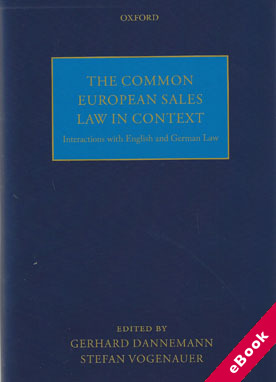
The device(s) you use to access the eBook content must be authorized with an Adobe ID before you download the product otherwise it will fail to register correctly.
For further information see https://www.wildy.com/ebook-formats
Once the order is confirmed an automated e-mail will be sent to you to allow you to download the eBook.
All eBooks are supplied firm sale and cannot be returned. If you believe there is a fault with your eBook then contact us on ebooks@wildy.com and we will help in resolving the issue. This does not affect your statutory rights.
European Contract Law unification projects have recently advanced from the Draft Common Frame of Reference (2009) to a European Commission proposal for an optional Common European Sales Law (2011) which is to facilitate cross-border marketing.
This book investigates for the first time how CESL and DCFR rules would interact with various aspects of domestic law, represented by English and German law. Nineteen chapters, co-authored by British and German scholars, examine such interface issues for eg pre-contractual relationships, notions of contract, formation, interpretation, and remedies, extending to non-discrimination, third parties, transfers or rights, aspects of property law, and collective proceedings.
They go beyond a critical analysis of CESL and DCFR rules by demonstrating where and how CESL rules would interact with neighbouring areas of English and German law before English and German courts, how domestic traditions might influence the application, which aspects might motivate sellers and buyers to choose or reject CESL, and which might serve as model for national legislators. The findings are summarized in the final two chapters.